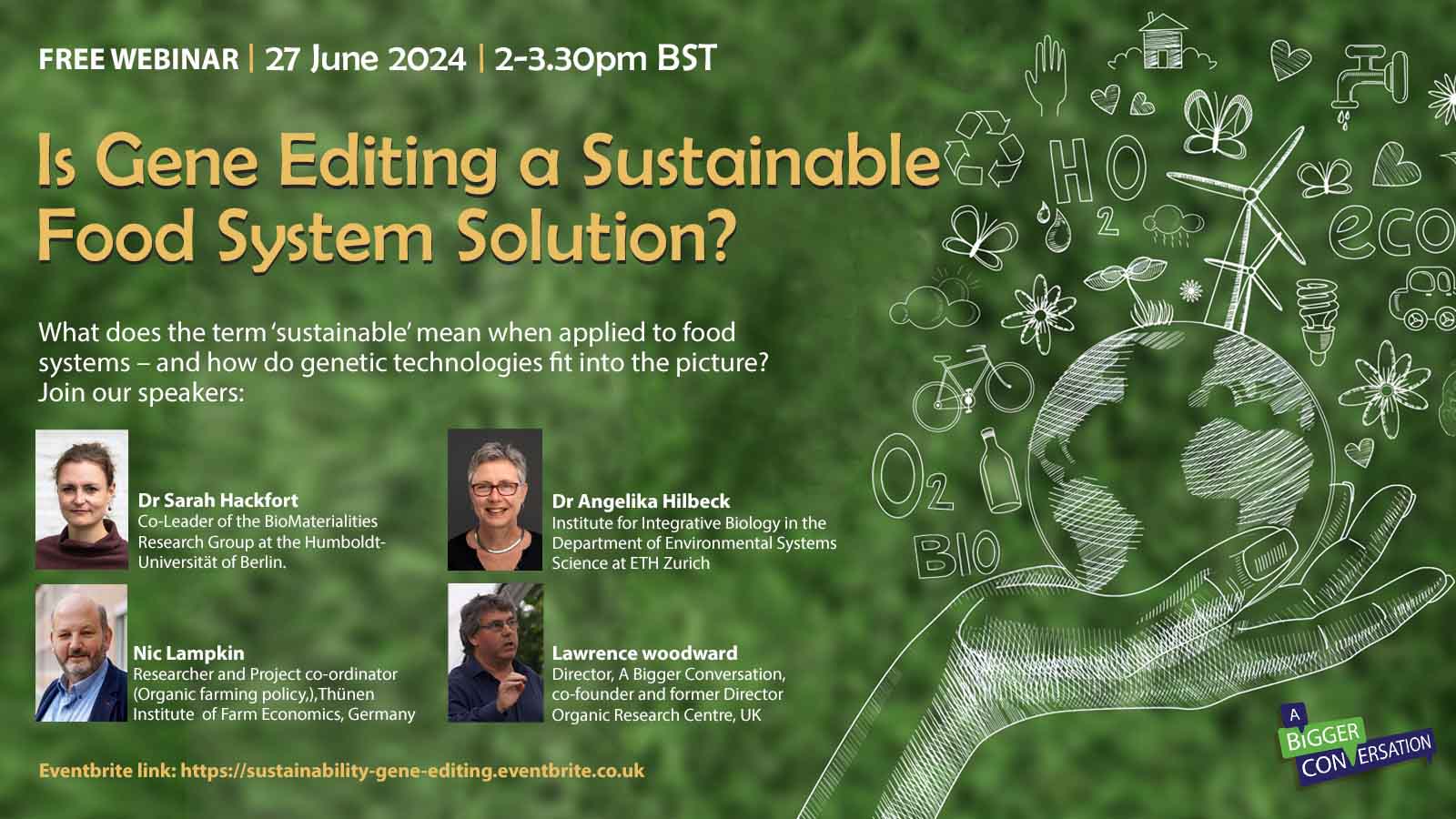One of the most common claims for gene editing technologies is that they can help make farming more sustainable, predominantly by improving resource and water use efficiency. This narrative is frequently repeated by politicians and in the media, and is rarely questioned or examined more deeply.
However, the term ‘sustainability’ is itself contentious, meaning different things to different people and in different contexts . This webinar aims to dig a little bit deeper into the notion of sustainability, exploring questions such as: what does the term ‘sustainable’ actually mean when applied to food systems? What are the different visions for a sustainable food system and the worldviews behind them? What are the barriers to their implementation? How do genetic technologies fit into the picture? How might a sustainability criteria help create a more sustainable food system?
Our panel of expert speakers have a wide range of knowledge on the complexities of sustainable food systems, and will give their views and answer questions from the audience in order to promote a deeper and more nuanced understanding of these issues. Join us for this timely and important discussion.
Speakers
Dr Sarah Hackfort
As co-Leader of the BioMaterialities Research Group at the Humboldt-Universität of Berlin, Sarah’s research spans many aspects of the bioeconomy (a political project to transition the economy away from fossil fuels and towards bio-based resources), including the social and political implications of technologies, feminist perspectives and sustainability. She has also worked on inclusive food system transformations. She completed a PhD in Economics and Social Sciences at Kassel University in 2014 and lectures at the Free University Berlin.
Dr Angelika Hilbeck
Angelika Hilbeck is a German/ Swiss agroecologist who co-founded the European Network of Scientists for Social and Environmental Responsibility (ENSSER) and Critical Scientists Switzerland (CSS). She has recently retired from researching and teaching about the environmental biosafety of genetically modified plants in ecosystems in the Department of Environmental Systems Science at ETH Zurich. Dr Hilbeck graduated in agricultural biology from the University of Hohenheim and received her doctorate in entomology from North Carolina State University in 1994.
Nic Lampkin
Nic has four decades’ experience researching organic farming and food systems, including technical, environmental, business and policy aspects. He is currently Researcher and Project Co-ordinator at the Thünen Institute of Farm Economics, Germany, where he is working on indicators to reward environmental policy outcomes, and on the implications of the EU’s 25% target for organic farming. From 2009-2019 he was Executive Director/CEO of the Organic Research Centre, Newbury. He has advised several governments and NGOs on environmental and organic farming policy.
Lawrence Woodward
Lawrence was the co-founder and former Director of the Organic Research Centre – Elm Farm, Lawrence was awarded an OBE in 2001 for services to organic farming, having played a pivotal role in the strategic and practical development of the organic sector in the UK and internationally. He is a former trustee of the New Economics Foundation, the Soil Association. He is currently a director of Beyond GM/A Bigger Conversation and acts as an advisor for several projects related to seed production, organic farming techniques and health.
Chair
Pat Thomas
Pat is a journalist, author and award-winning campaigner specialising in environment and health. She is co-founder and director of Beyond GM/A Bigger Conversation in the UK. Pat is a former editor of the Ecologist magazine, has run campaigns for Compassion in World Farming and Paul McCartney’s Meat Free Monday. She has sat on the boards of the Soil Association and the Organic Research Centre.
Post Webinar Links
- You can watch the video of this session here.
- Access the Q&A here.
- Access the chat here.
- Access Suggested Reading here.

